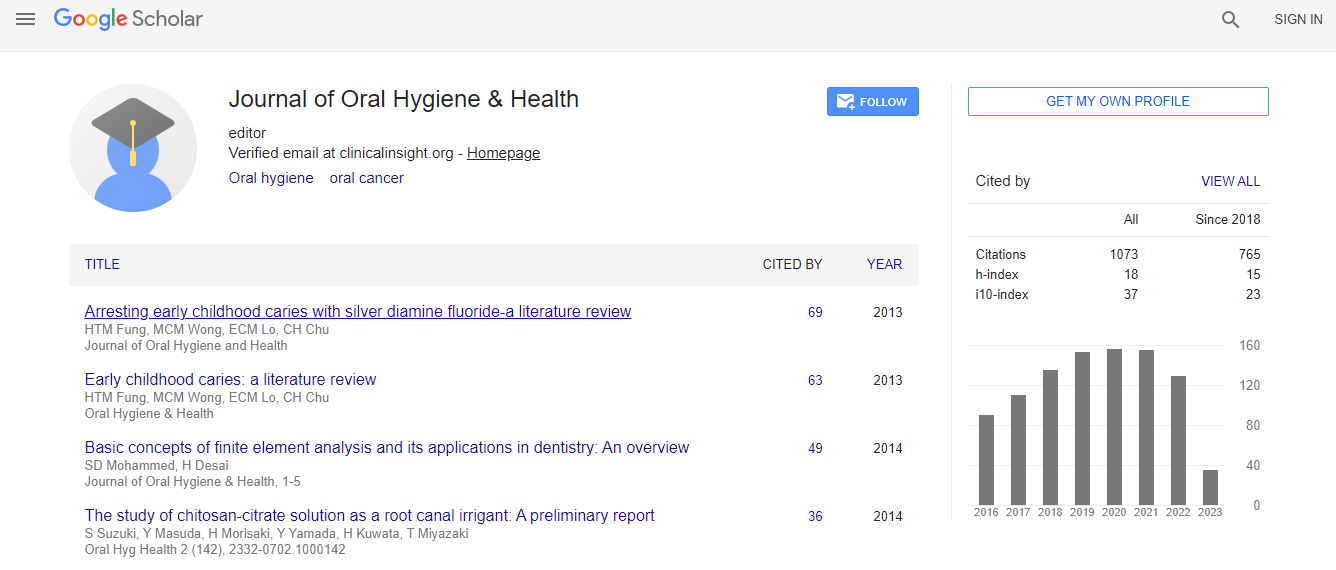Our Group organises 3000+ Global Events every year across USA, Europe & Asia with support from 1000 more scientific Societies and Publishes 700+ ������ Journals which contains over 50000 eminent personalities, reputed scientists as editorial board members.
������ Journals gaining more Readers and Citations
700 Journals and 15,000,000 Readers Each Journal is getting 25,000+ Readers
Citations : 1073
Indexed In
- Index Copernicus
- Google Scholar
- Open J Gate
- JournalTOCs
- RefSeek
- Hamdard University
- EBSCO A-Z
- OCLC- WorldCat
- Publons
- Geneva Foundation for Medical Education and Research
- Euro Pub
- ICMJE
Useful Links
Recommended Journals
Related Subjects
Share This Page
Changes of salivary MMP-3 and TIMP-1 levels in periodontal therapy with Pelargonium sidoides DC. active substances
International Conference on Oral Health and Dental Medicine
Rasa Baniene
Lithuanian University of Health Sciences, Lithuania
ScientificTracks Abstracts: J Oral Hyg Health
DOI:
Abstract
Statement of the Problem: Periodontitis is a chronic inflammatory disease affecting the supporting structures of the teeth. This disease affects more than 10% of the population and is the most common cause of tooth loss worldwide. Periodontitis is caused by bacteria that adhere to and grow on the tooth's surfaces, along with an over-increased immune response against these microorganisms and induced the activation of the molecular cascade of inflammation. Biologically active compounds of Pelargonium sidoides root extract (PSRE) demonstrated possibility to modulate bacterial virulence, stimulate host immune responses and reduced inflammation. Thus, they are coming under considerable scrutiny as potentially new non-aggressive therapeutic agents for managing periodontal infections. The purpose of this study is to evaluate changes in molecular markers MMP-3, TIMP-1 in association with clinical signs of periodontitis and assess the protective effect of Pelargonium sidoides root extract (PSRE). Methods: Saliva from 20 heathy persons (control group), 20 periodontitis patients and 20 periodontitis patients, treated with PSRE were collected using Salivette saliva sample collection kit. Samples were centrifuged at 3650 rpm, aliquoted and stored at -80oC until analysis. Amount of MMP-3 and TIMP-1 in saliva of periodontitis patients and healthy persons was evaluated using commercial ELISA kits. Results: MMP-3 concentration was significantly higher in saliva of periodontitis patient's group as compared to healthy persons. After treatment with PSRE, MMP-3 level in patient group saliva decreased and returned to control group level. TIMP- 1 in periodontitis patient's saliva was significantly lower as compared to healthy persons. After treatment with PSRE, TIMP-1 concentration in patients group saliva increased significantly as compared with TIMP-1 concentration in the same group before treatment. Conclusion: Biologically active compounds of Pelargonium sidoides root extract decreased inflammation and protected periodontal tissue.Biography
Rasa Baniene is a professor of Biochemistry at the Lithuania Lithuanian University of Health Sciences, Department of Biochemistry. Rasa Baniene is specializing in investigation of potential biomarkers in saliva for oral cancer detection and in analysis of molecular mechanisms of the regulation of energy transformation in the human tissue. She published over 50 peer reviewed journal publications, 4 book chapters and she has managed international and national projects in the above mentioned areas.
E-mail: rasa.baniene@lsmuni.lt

